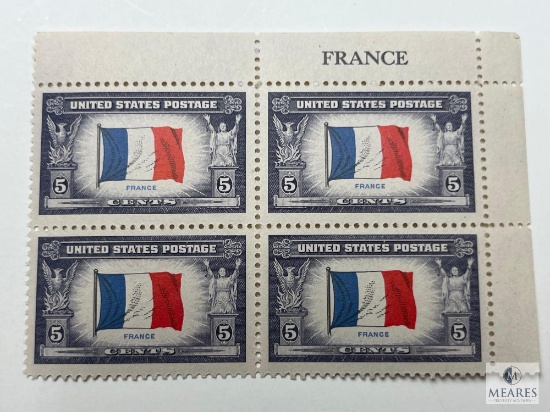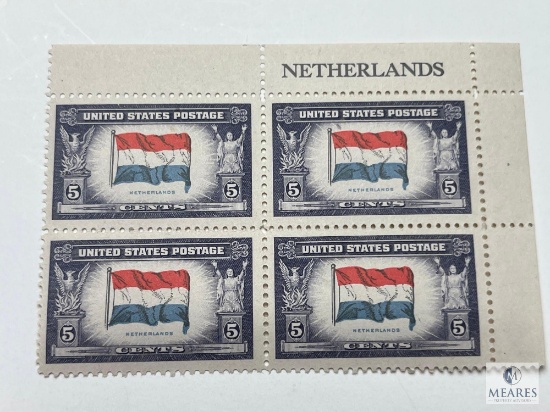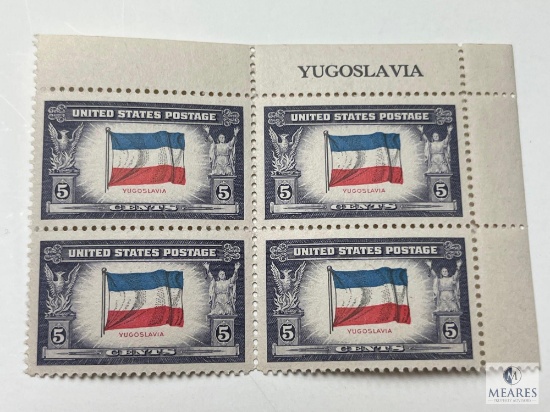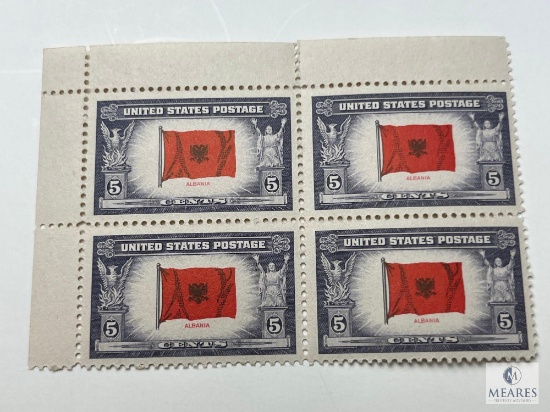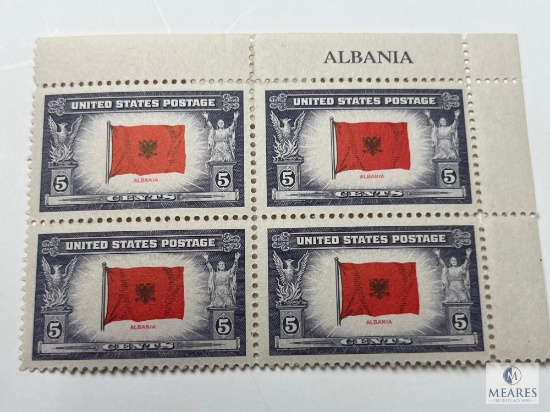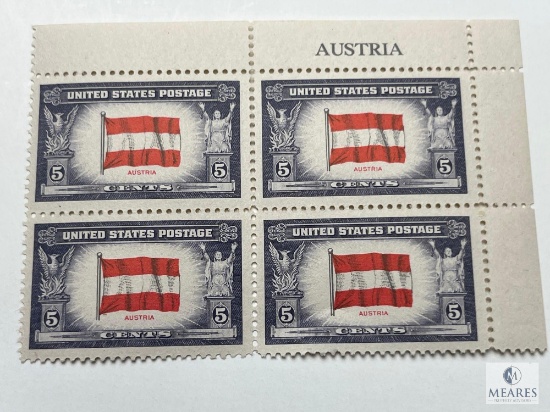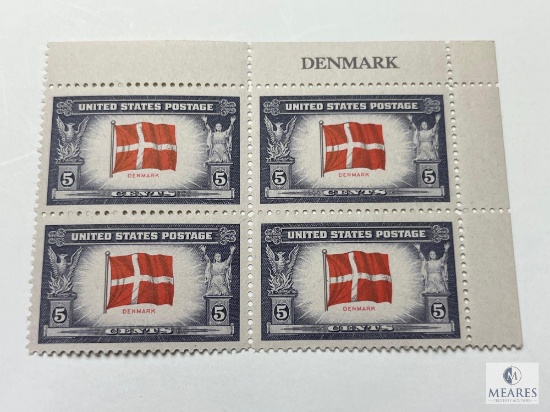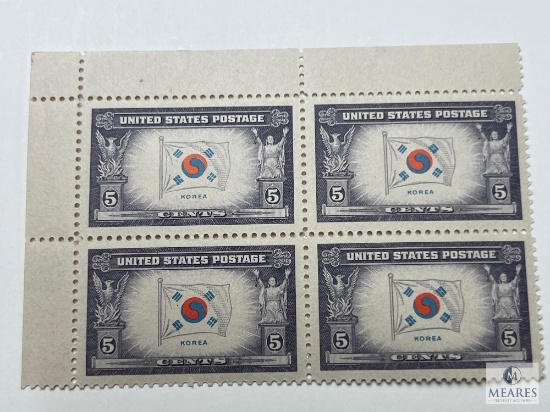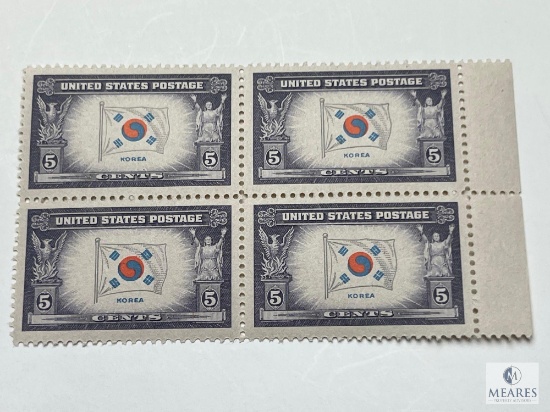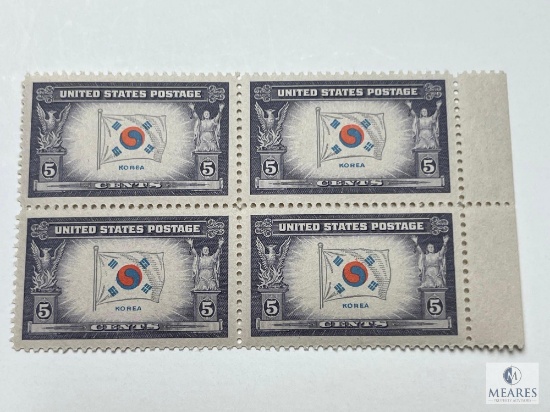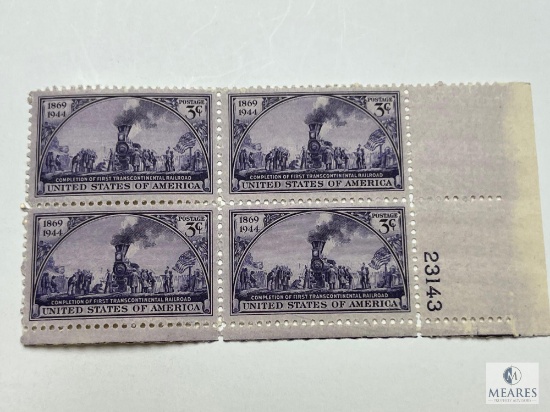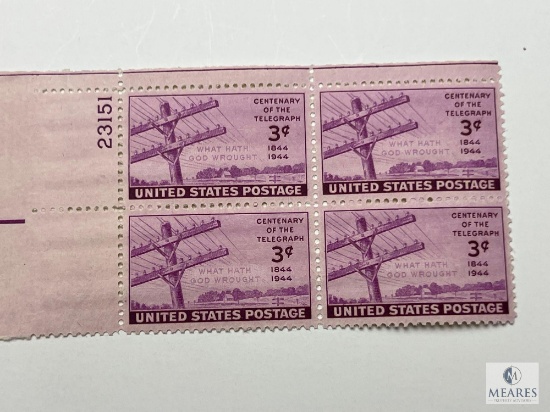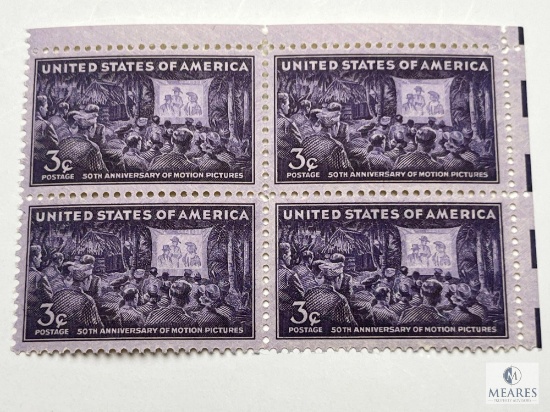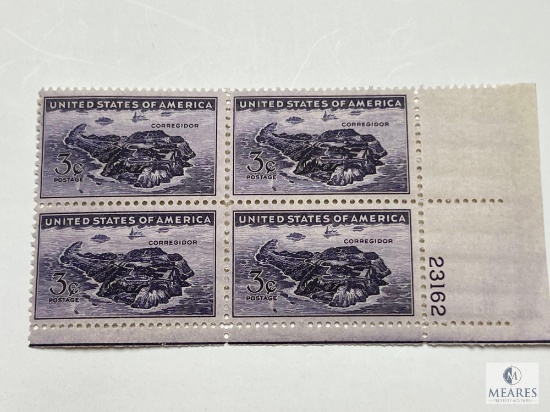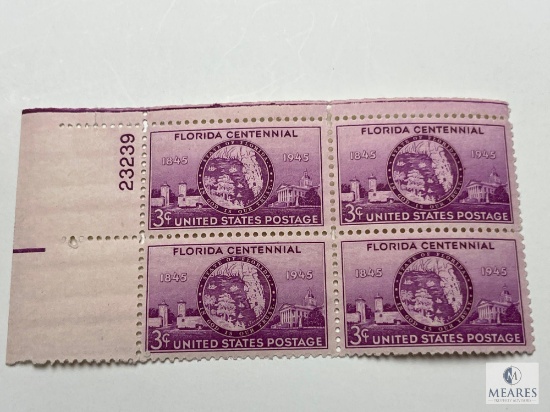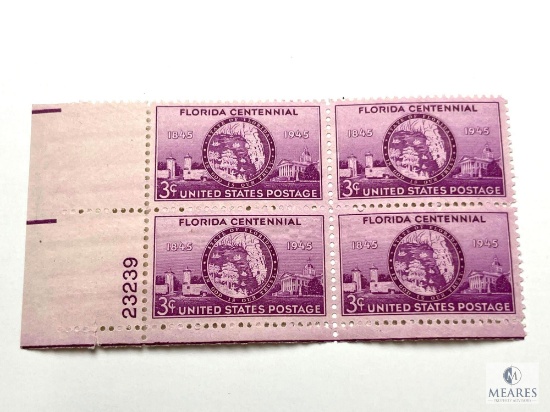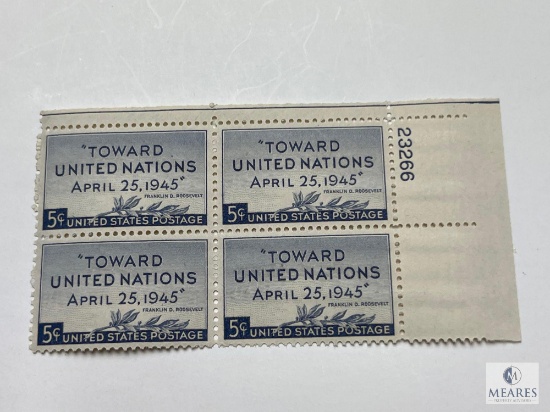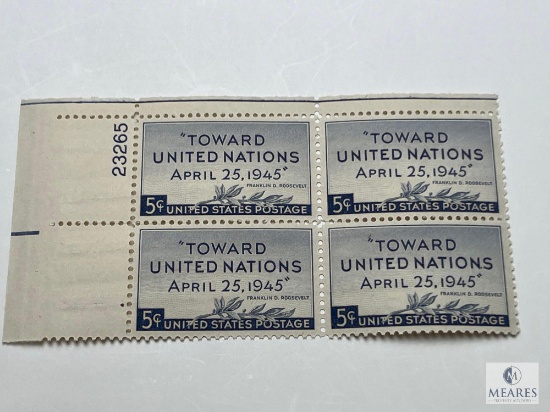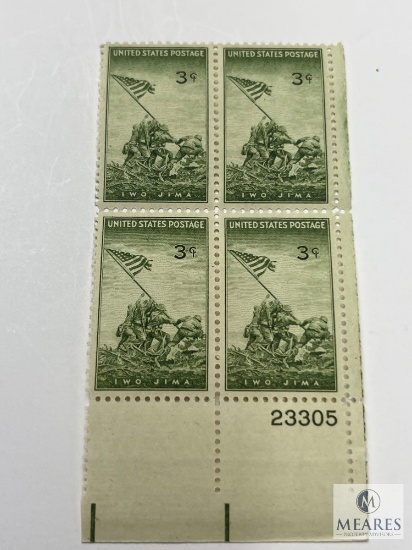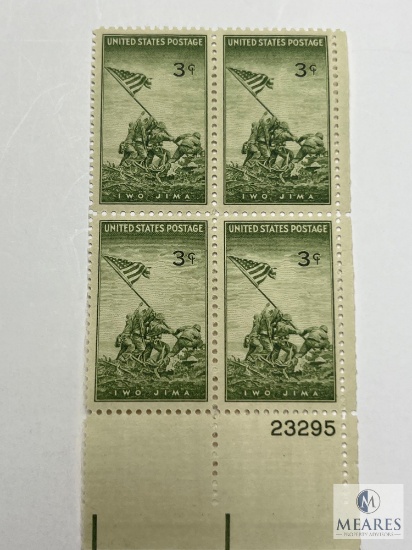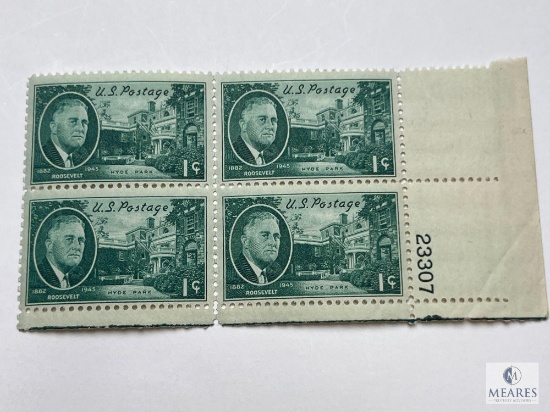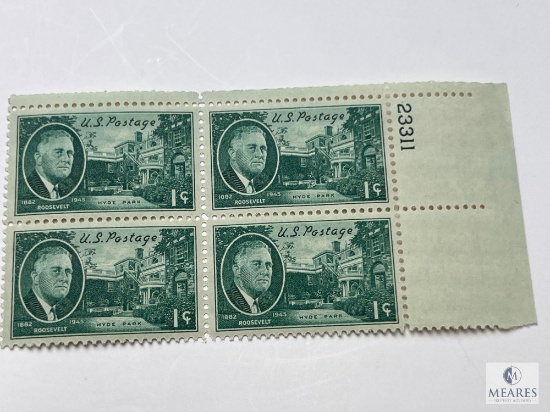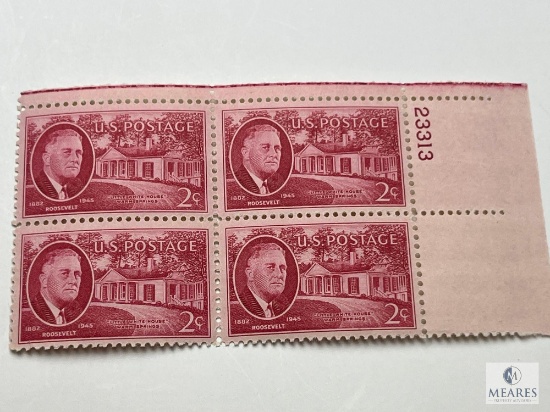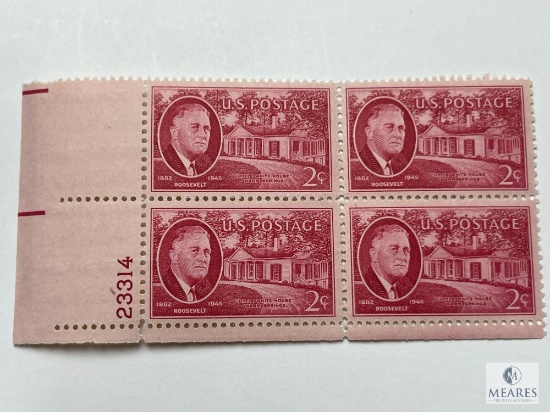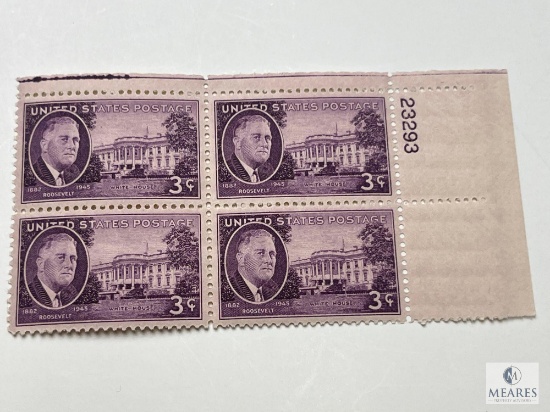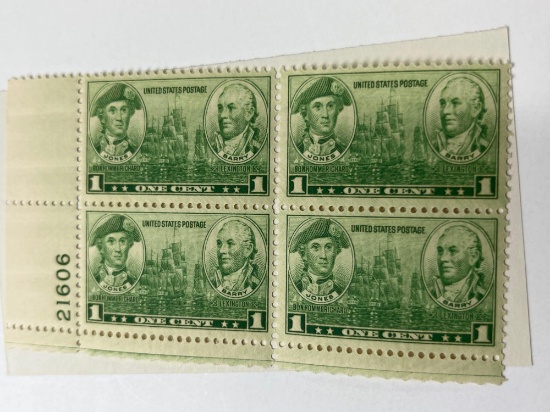
One-Owner Lifetime Stamp Collection - Auction #1
Auction closed.
Auction closed.
One-Owner Lifetime Stamp Collection - Auction #1
Auction closed.
Auction closed.
Internet Premium: 15%
See Special Terms for additional fees
See Special Terms for additional fees
Description
This is the first of several auctions for this upstate South Carolina stamp collector. It features 400 lots of US and foreign stamps in singles, groups and unopened envelopes. All items sell to the highest bidder - register for one auction and bid in both!
Need help with bidding? Get Help
Closed Lots
#915 - 1943 Overrun Countries: 5c Flag of France Plate Block of Four Stamps
U.S. #915 is part of the Overrun Countries Series, which honors each of the nations invaded by Axis powers during World War II. It pictures the flag of France, which features red, white, and blue vertical bars. Red and blue are the traditional colors of Paris, and white, the "ancient French colour," was added to make it a tricolor. The flag was adopted in 1794.
#913 - 1943 Overrun Countries: 5c Flag of Netherlands Plate Block of Four Stamps
U.S. #913 is part of the Overrun Countries Series, which honors each of the nations invaded by Axis powers during World War II. It pictures the flag of the Netherlands, which features red, white, and blue stripes. The flag was first introduced in 1572, making it one of the first tricolor flags, and the oldest still in use.
# 917a - 1943 5c Flag of Yugoslavia Plate Block of Four Stamps
U.S. #917 is part of the Overrun Countries Series, which honors each of the nations invaded by Axis powers during World War II. It pictures the flag of Yugoslavia, which features blue, white, and red stripes and was adopted in 1922. The flag has since been changed to include a red star in the center.
#918 1943 5c Overrun Countries Albania Plate Block of Four US Stamps
U.S. #918 is part of the Overrun Countries Series, which honors each of the nations invaded by Axis powers during World War II. It pictures the flag of Albania, which features a red background with a black two-headed eagle at its center. It is based on the seal of Gjergj Skanderberg, who led the 15th century revolt against the Ottoman Empire, bringing some regions of Albania a period of independence. The flag was officially adopted in 1922.
#918 1943 5c Overrun Countries Albania Plate Block of Four US Stamps
U.S. #918 is part of the Overrun Countries Series, which honors each of the nations invaded by Axis powers during World War II. It pictures the flag of Albania, which features a red background with a black two-headed eagle at its center. It is based on the seal of Gjergj Skanderberg, who led the 15th century revolt against the Ottoman Empire, bringing some regions of Albania a period of independence. The flag was officially adopted in 1922.
#919 1943 5c Overrun Countries Austria Plate Block of Four US Stamps
U.S. #919 is part of the Overrun Countries Series, which honors each of the nations invaded by Axis powers during World War II. It pictures the flag of Austria, which features two red horizontal bands with a white band in between. It is one of the oldest national flag designs in the world. According to legend, Duke Leopold V invented the flag design during the Crusades. Following a battle, his white clothes were drenched in blood, but when he removed his belt the white cloth underneath was still clean.
#920 - 1943 Overrun Countries: 5c Flag of Denmark Block of Four Stamps
U.S. #920 is part of the Overrun Countries Series, which honors each of the nations invaded by Axis powers during World War II. It pictures the flag of Denmark, which features a white Scandinavian cross on a red background. Adopted in the 14th century, it is the oldest state flag still being used by an independent nation.
#921 - 1944 Overrun Countries: 5c Flag of Korea Block of Four Stamps
U.S. #921 is part of the Overrun Countries Series, which honors each of the nations invaded by Axis powers during World War II. It pictures the flag of Korea, which features the Chinese Yin and Yang symbol and four symbols representing the Taoist philosophical ideas of the universe -- harmony, symmetry, balance, and circulation.
#921 - 1944 Overrun Countries: 5c Flag of Korea Block of Four Stamps
U.S. #921 is part of the Overrun Countries Series, which honors each of the nations invaded by Axis powers during World War II. It pictures the flag of Korea, which features the Chinese Yin and Yang symbol and four symbols representing the Taoist philosophical ideas of the universe -- harmony, symmetry, balance, and circulation.
#921 - 1944 Overrun Countries: 5c Flag of Korea, Block of Four Stamps
U.S. #921 is part of the Overrun Countries Series, which honors each of the nations invaded by Axis powers during World War II. It pictures the flag of Korea, which features the Chinese Yin and Yang symbol and four symbols representing the Taoist philosophical ideas of the universe -- harmony, symmetry, balance, and circulation.
#922 - 1944 3c Completion of First Transcontinental Railroad, Block of Four Stamps
On May 10, 1869, the Transcontinental Railroad was completed with the driving of the golden spike at Promontory Summit, Utah.
#924 - 1944 3c Centenary of the Telegraph, Plate Block of Four Stamps
U.S. #924 was issued to commemorate the 100th anniversary of the first official telegraph. Its inventor, Samuel F.B. Morse, sent the transmission on May 24, 1844. That day, Morse sat in the Supreme Court chamber of the Capitol and tapped out the message, What hath God wrought! This phrase is included in the stamp design among the telegraph wires.
#926 - 1944 3c 50th Anniversary of Motion Pictures, Set of Four Stamps
U.S. #926 commemorates the 50th anniversary of motion pictures. Debuting in 1895, the motion picture greatly enriched peoples lives. Often, troops stationed overseas were shown currently released movies to help keep them in good spirits. The image of troops watching a film was selected for this stamp to show the impact motion pictures had on the nation during the war. Many movies of the era were produced to raise morale, while others served as informational films, educating the public and troops on the war.
#925 - 1944 3c Corregidor, Manila Bay, Plate Block of Four Stamps
Called the Gibraltar of the Pacific, Corregidor, honored on U.S. #925, was the site of a World War II standoff between U.S. and Philippine troops and Japanese forces. Today, the entire island is a national shrine to the soldiers who died in its defense.
#927 - 1945 3c Florida Statehood Plate Block of Four Stamps
The Florida Centennial issue, U.S. #927, pictures the state seal, the Gates of St. Augustine, and the capitol at Tallahassee.
#927 - 1945 3c Florida Statehood Plate Block of Four Stamps
The Florida Centennial issue, U.S. #927, pictures the state seal, the Gates of St. Augustine, and the capitol at Tallahassee.
#928 - 1945 5c UN Peace Conference "Toward United Nations" Plate Block of Four Stamps
When 46 nations gathered in San Francisco on April 25, 1945, they were exhausted from the extended war, disheartened by the inhumanity they had seen, and determined to prevent future generations from experiencing what they had seen firsthand. Their ultimate goal was to form an international organization that would have the power to maintain security and foster prosperity and give human rights an international legal status.
#928 - 1945 5c UN Peace Conference "Toward United Nations" Plate Block of Four Stamps
When 46 nations gathered in San Francisco on April 25, 1945, they were exhausted from the extended war, disheartened by the inhumanity they had seen, and determined to prevent future generations from experiencing what they had seen firsthand. Their ultimate goal was to form an international organization that would have the power to maintain security and foster prosperity and give human rights an international legal status.
#929 - 1945 3c US Armed Forces: Iwo Jima Plate Block of Four Stamps
When this stamp was first proposed, some people protested because it was planned to be printed in purple and because it would picture living people a violation of postal regulations. At the time, purple was the designated color for the 3... first-class letter rate, but postal authorities changed the color to Marine green. The USPS answered the other concern replying that the stamp didn't honor specific individuals, rather it honored the fighting spirit of the Marines on Iwo Jima. Despite these early objections, the stamp went on to become the most popular US commemorative at that time.
The stamp recreated the iconic Joe Rosenthal photograph of six Marines raising the flag over Mount Suribachi on February 23, 1945. The photo would go on to win a Pulitzer Prize for Photography and is considered one of the most recognizable images from the war.
The stamp recreated the iconic Joe Rosenthal photograph of six Marines raising the flag over Mount Suribachi on February 23, 1945. The photo would go on to win a Pulitzer Prize for Photography and is considered one of the most recognizable images from the war.
#929 - 1945 3c US Armed Forces: Iwo Jima Plate Block of Four Stamps
When this stamp was first proposed, some people protested because it was planned to be printed in purple and because it would picture living people a violation of postal regulations. At the time, purple was the designated color for the 3... first-class letter rate, but postal authorities changed the color to Marine green. The USPS answered the other concern replying that the stamp didn't honor specific individuals, rather it honored the fighting spirit of the Marines on Iwo Jima. Despite these early objections, the stamp went on to become the most popular US commemorative at that time.
The stamp recreated the iconic Joe Rosenthal photograph of six Marines raising the flag over Mount Suribachi on February 23, 1945. The photo would go on to win a Pulitzer Prize for Photography and is considered one of the most recognizable images from the war.
#930 - 1945 1c Roosevelt and Hyde Park Plate Block of Four Stamps
U.S. #930 was issued as part of a series of four memorial stamps issued just a few months after President Franklin Roosevelt's unexpected death in April 1945. This stamp commemorates Franklin Roosevelt and the place of his birth, Hyde Park, NY. He lived at Hyde Park until enrolling in preparatory school at the age of 14.
#930 - 1945 1c Roosevelt and Hyde Park Plate Block of Four Stamps
U.S. #930 was issued as part of a series of four memorial stamps issued just a few months after President Franklin Roosevelt's unexpected death in April 1945. This stamp commemorates Franklin Roosevelt and the place of his birth, Hyde Park, NY. He lived at Hyde Park until enrolling in preparatory school at the age of 14.
#931 - 1945 2c Roosevelt and Little White House Plate Block of Four Stamps
U.S. #931 was issued as part of a series of four memorial stamps issued just a few months after President Franklin Roosevelt's unexpected death in April 1945. This stamp commemorates the time President Roosevelt spent at the Little White House in Warm Springs, Georgia. As therapy following an attack of polio, Franklin Roosevelt swam in the warm mineral pools of Warm Springs, Georgia. In an effort to help polio victims afford treatment, Roosevelt bought the land surrounding the springs and established The Warm Springs Foundation.
#931 - 1945 2c Roosevelt and Little White House Plate Block of Four Stamps
U.S. #931 was issued as part of a series of four memorial stamps issued just a few months after President Franklin Roosevelt's unexpected death in April 1945. This stamp commemorates the time President Roosevelt spent at the Little White House in Warm Springs, Georgia. As therapy following an attack of polio, Franklin Roosevelt swam in the warm mineral pools of Warm Springs, Georgia. In an effort to help polio victims afford treatment, Roosevelt bought the land surrounding the springs and established The Warm Springs Foundation.
#932 - 1945 3c Roosevelt and White House Plate Block of Four Stamps
Franklin Roosevelt was President at one of the most important times in American history. During his time at the White House (commemorated on U.S. #932), Roosevelt successfully led America through both the Great Depression and World War II. This stamp was issued as part of a series of four memorial stamps issued just a few months after President Roosevelt's unexpected death in April 1945.


 x Cancel
x Cancel